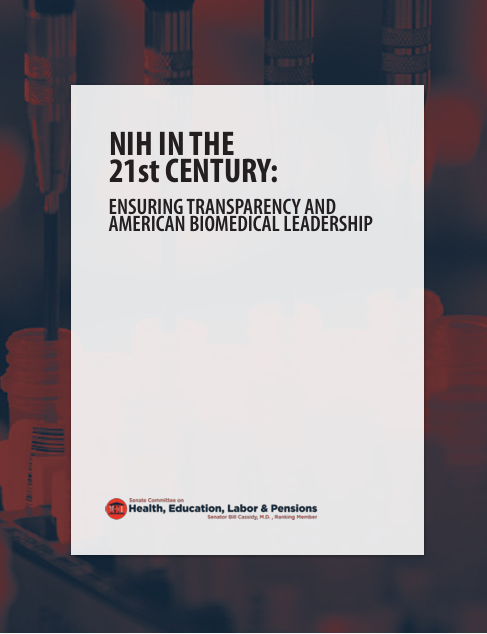Ranking Member Cassidy Releases New Proposals to Modernize NIH
WASHINGTON – Today, U.S. Senator Bill Cassidy, M.D. (R-LA), ranking member of the Senate Health, Education, Labor, and Pensions (HELP) Committee, released a white paper detailing proposals to improve the National Institutes of Health (NIH). Last year, Cassidy requested feedback from stakeholders on policies Congress could consider to modernize NIH.
NIH funds more biomedical research than any other public institution in the world, dedicating 91 percent of its $49 billion budget to research both inside and outside the agency. However, Congress has not thoroughly reviewed NIH operations and practices since the 21st Century Cures Act passed in 2016, nearly a decade ago.
In the responses to Cassidy’s request for information (RFI), stakeholders raised concerns over NIH’s grant funding priorities, including directing funding away from early-stage research in favor of supporting more late-stage research. While this practice may have high returns on bringing discoveries to patients in the short term, neglecting funding in the crucial beginning stages of research could ultimately limit the creation of lifesaving cures and treatments. In the report, Cassidy emphasized the importance of NIH maintaining a balanced portfolio, so all stages of medical research and other public health priorities are adequately funded.
The report also examined how the United States can sustain its advantage in biomedical research to ensure Americans receive the most innovative treatments as quickly as possible. Cassidy laid out several proposals to address this, including streamlining peer review of research, and addressing challenges in recruiting and maintaining our biomedical workforce. He also highlighted the importance of robust collaboration between NIH, public health and health care institutions, and the private sector in identifying how NIH policies can be adapted to most effectively support potentially transformative research.
Additionally, many stakeholders noted that NIH has failed to convene the Scientific Management Review Board (SMRB), an advisory board required by Congress to provide feedback on agency structure and operations. This lack of transparency combined with declining public trust in the agency during the COVID-19 pandemic underscores the need for greater accountability. In the report, Cassidy emphasized the need for NIH to enhance transparency, including reestablishing SMRB and creating an apparatus allowing public input on agency practices.
Nonpartisan watchdogs, such as the Department of Health and Human Services Office of the Inspector General (HHS OIG), have also found deficiencies in NIH oversight of its extramural grants. Cassidy recommends holding NIH accountable to carry out its grants management responsibilities while balancing more effective oversight with reducing unnecessary burden on researchers.
Read the full white paper here.
For all news and updates from HELP Republicans, visit our website or Twitter at @GOPHELP. Click here to unsubscribe.
